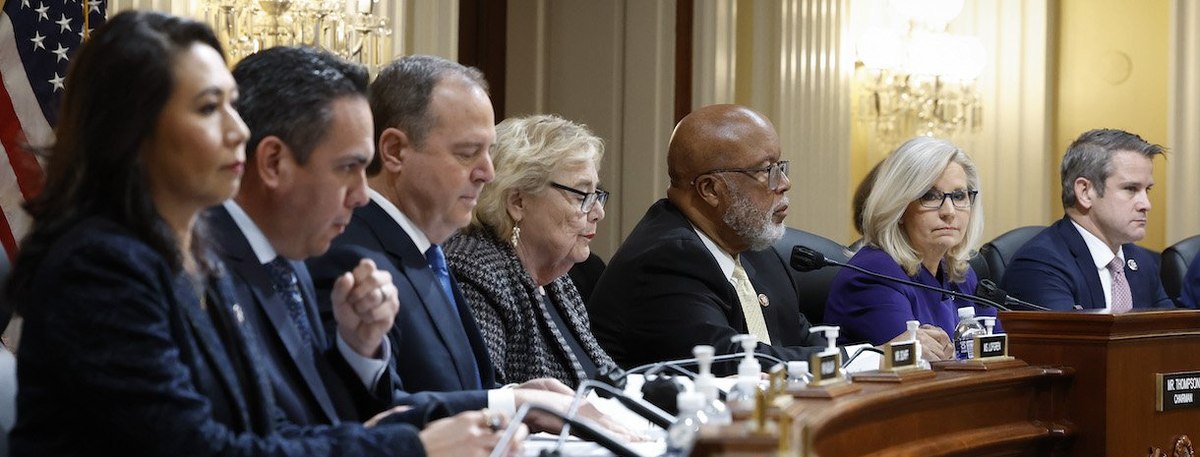After the House Select January 6 committee released its final report, the Economist/YouGov asked Americans a variety of questions about the Capitol rioters, former President Donald Trump's involvement, and the House committee's handling of the investigation. The results show that approval of the Capitol takeover remains modest but has increased. Most Americans believe Trump is at least somewhat responsible for the day's events. Two in five Americans approve of the House committee's handling of the January 6 investigation, and slightly more are supportive of its decision to issue criminal referrals for Donald Trump.
While most Americans disapprove of the January 6 Capitol takeover, the share who approve has increased significantly since the event first took place. Two years ago, just 9% of Americans said they strongly or somewhat approved of the takeover; now, 20% do. The share who approve of the takeover has increased 13 percentage points among Democrats (to 16%, from 3%) and 16 percentage points among Republicans (to 32%, from 16%), with no significant change observed among Independents. However, the share of Independents who say they're not sure has increased to 25% from 6%.
The House committee's final report stated that "one man" — Donald Trump — was the central cause of the Capitol takeover. Americans' views on Trump's culpability have changed little since the 2021 attack, when 64% of people believed he bore at least a little responsibility, including 41% who said he bore a lot of responsibility. Now, 66% say he bears at least a little responsibility, including 39% who say he bears a lot.
Democrats' views on the extent of Trump's involvement have shifted some: Just after the attack, 76% believed Trump bore a lot of responsibility; now, just 69% do. But the vast majority of Democrats then and now have believed he bears at least a little responsibility (91% now vs. 93% just after the attack). While Republicans' skepticism of Trump's involvement increased in January 2022, one year after the takeover, their views are now similar to what they were two years ago when the attack occurred: 39% say Trump bears at least a little responsibility, including 8% who say he bears a lot; 51% say he bears no responsibility.
Regardless of Trump's responsibility for the January 6 attack, were his actions illegal? A little less than half of Americans — 42% — think they were, down slightly from 46% in July 2022. Most of this change has been among Democrats, 74% of whom think Trump's actions around January 6 were illegal, down 8 percentage points since July.
Americans' evaluations of the House Select Committee and its investigation into January 6 have remained relatively constant throughout its tenure. Nearly identical shares of Americans approve (40%) and disapprove (39%) of its handling of the investigation. However, opinions are highly polarized by party, with Democrats being far more likely to approve (68%) than disapprove (17%) and Republicans being far less likely to approve (19%) than disapprove (66%). Independents are slightly less likely to approve of the committee's investigation (30%) than disapprove (36%).
At its conclusion, the January 6 House committee panel voted to issue four criminal referrals for Trump. More Americans approve (45%) than disapprove (37%) of these referrals. The vast majority of Democrats — 79% — approve, while just 15% of Republicans and 38% of Independents do.
— Carl Bialik and Linley Sanders contributed to this article
See the toplines and crosstabs from the Economist/YouGov poll conducted on December 31, 2022 - January 3, 2023 among 1,500 U.S. adult citizens.
Methodology: Respondents were selected from YouGov’s opt-in panel using sample matching. A random sample (stratified by gender, age, race, education, geographic region, and voter registration) was selected from the 2019 American Community Survey. The sample was weighted according to gender, age, race, education, 2020 election turnout and presidential vote, baseline party identification, and current voter registration status. Demographic weighting targets come from the 2019 American Community Survey. Baseline party identification is the respondent’s most recent answer given prior to June 1, 2022, and is weighted to the estimated distribution at that time (34% Democratic, 31% Republican). The margin of error for the overall sample is approximately 3%.
Image: Getty Images (Anna Moneymaker)










